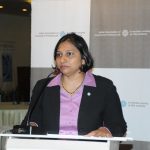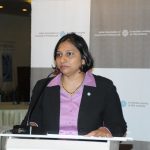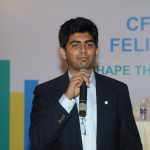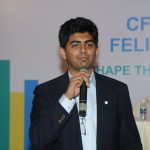- April 8, 2016
- Posted by: kunalsabnis
- Category:Annual Forecast, BLOG, Events, Mumbai, Panel Discussion
Contributed by: Kunal Sabnis, CFA
The 8th IAIP Annual Forecast Event FY2017 was held on 1 April 2016 at the BSE International Convention Hall, Bombay Stock Exchange, Mumbai. Kishor Bagri, CFA, Director, IAIP, kicked off the evening’s proceedings with an overview of the fiscal year 2015-16. He pointed out that the domestic economic scenario was improving as evident in cement and infra projects pick-up but corporate leverage remained high along with rural distress. Globally, most countries were witnessing a slowdown with many emerging indices posting negative returns.
Jayesh Gandhi, CFA, President, IAIP gave an overview of IAIP’s work through the year. He highlighted that the survey indicated that while most Indians trust investment firms, an increasing number are seeking greater transparency and ethical conduct. Shankar Jadhav, Head of Strategy, Bombay Stock Exchange (BSE) opined that business has grown well in the past few years. BSE, well supported by the government of India, has done its bit towards growing the Indian economy by enhancing research capabilities, improving transparency and regulating markets well.
Kishor then introduced the power-packed panel which consisted of Sunil Singhania, CFA, CIO – Equity Investments, Reliance Mutual Fund; Mahesh Patil, Co-CIO Birla Sun Life AMC; Neelkanth Mishra, MD and India Equity Strategist, Credit Suisse; Sonal Varma, Executive Director and Chief India Economist, Nomura India; and Paritosh Mathur, Executive Vice President, IDFC Bank Ltd. Nikunj Dalmia, Chief Editor – Financial Markets, ET Now moderated the panel.
Excerpts from the panel discussion:
Sunil Singhania, CFA, CIO – Equity Investments, Reliance Mutual Fund
“Low inflation is not great and low oil prices are good up to a level. The government’s effort to clean up the economy led to domestic pain for the first two years but is now showing positive results. Strategic level initiatives taken in the power sector have translated into lower power deficit this year. With respect to investments, people find excuses to be negative but long term it pays to be optimistic.”
Sunil reiterated that the Indian economy will double to $4tn in the next six to seven years which will auger well for equity markets. He is positive on financials and consumption related stocks.
Mahesh Patil, Co-CIO Birla Sun Life AMC
“Fiscal 2016 was a disappointment due to huge deflationary impact coupled with global commodity downfall and public sector banks’ asset blow-ups. This impacted earnings of companies and in turn the return of stock indices. Going forward, better monsoon and pay commission disbursements will improve the rural economy. Crude has settled at a lower level but the full benefit has not been passed to the consumers. Instead, the government is investing the saved money into roads, urban transport and irrigation which will help to boost the economy.”
Mahesh opined that cement volumes, auto sales numbers and some areas in Infrastructure and consumption have started to see a pick-up.
Neelkanth Mishra, MD and India Equity Strategist, Credit Suisse
“Nifty is not the true reflection of the domestic economy since most constituents have higher share of overseas business. Investors run the risk of missing the domestic boom if they focus just on the Nifty. Pick-up in growth is evident in cement, auto and oil volumes. India has a high proportion of informal economy and higher demand for currency points to an uptick as well. Investors should continue to focus on quality companies with earnings visibility and should avoid financially leveraged companies. India is an under banked economy and there is huge scope for the banking sector to grow.”
Neelkanth would prefer to stick to bonds on a one-year time frame and expects equities to outperform all asset classes over a five year tenure.
Sonal Varma, ED and Chief India Economist, Nomura India
“The domestic situation has been satisfactory with 7.5% GDP growth considering a global slowdown. Reforms expectations were unrealistic and have now moderated. The biggest risk that India faces is that China disappoints further and outflow of foreign money. Banks average cost of deposits will stay high since they took high cost of deposits in the last two to three years and the Reserve Bank of India (RBI) has maintained tight liquidity as well. Globally volatility was suppressed during the last 4-5 years due to stimulus packages and their withdrawal will keep volatility elevated. Negative interest rates are not great for banks as their net interest margins are impacted.”
Domestically, Sonal believes that real estate macros are in a bad shape, which can lead to massive price correction or extended time correction. Inflation will be sticky and the RBI is expected to cut 25 bps of repo rate.
Paritosh Mathur, Executive Vice President, IDFC Bank Ltd.
“The government has been clearing many roadblocks for corporates and along with the RBI is working towards very healthy balance sheets in the country. Process of recognising stressed assets and sectors is done and plans have been put in place. Corporate balance sheets will start improving in the next two to three quarters. Private banks are placed much better due to higher capital adequacy and will benefit as foreign banks are facing issues. Banks who blend digital innovation with retail focus will benefit the most.”
Paritosh is of the view that supply of bonds will be there at the longer end of the yield curve whereas the shorter tenure yields would dip below 7%.
Kishor concluded the event by announcing the winners of the FY16 predictions.
-KS





































































































































































